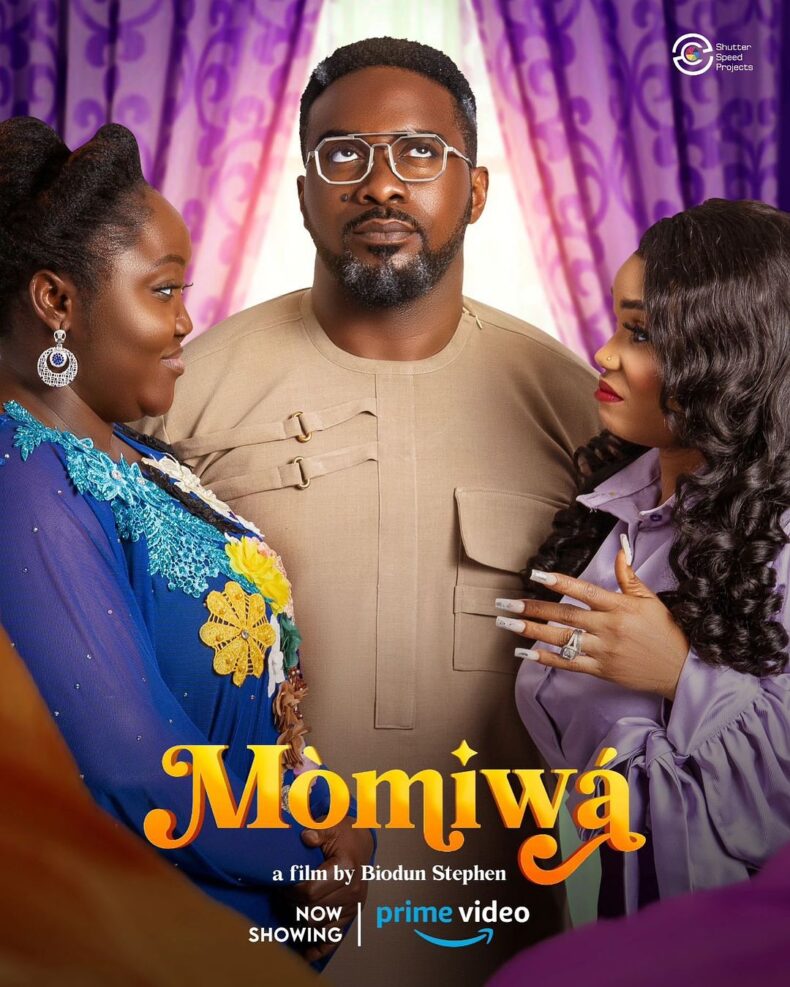Momiwa
Uzor Arukwe, Blessing Obasi, Iyabo Ojo, Mc Lively, Precious Udoh, Akpujiha Udoh, Lillian Afegbai
A beloved housekeeper brings joy until wife returns, stirring tension and rivalry for affection within the family
1hour 47minutes
Biodun Stephen
Biodun Stephen
Gift Collins, Biodun Stephen
2024
Prime Video
Relatable story, Great performance, Solid screenplay and great execution
Rushed ending
Momiwa follows the story of Naeto, aka Dadiwa (portrayed by Uzor Arukwe), a man whose wife, Kiki (portrayed by Iyabo Ojo) abandons him and their children, Vida (portrayed by Precious Udoh) and Abel (portrayed by Akpujiha Michael). In her absence, Momiwa (portrayed by Blessing Jessica Obasi), the housekeeper, takes care of the family with unconditional love and unwavering devotion. When Kiki returns a decade later, she seeks forgiveness and reconciliation with her husband Dadiwa and their children. Her presence ignites tension and competition for affection within the family dynamic.
Momiwa, directed by Biodun Stephen, embodies the classic charm of Nollywood, presenting a storyline that feels immediately recognizable. Its predictable nature is well compensated for by the solid writing, a straightforward narrative, and outstanding performances. Biodun Stephen stays true to her signature style, crafting relatable and immersive stories, and “Momiwa” is no exception. By avoiding ambiguity, she delivers a narrative that resonates with the audience, providing all the essential elements for an engaging and genuine experience. Biodun has a way of giving you all the elements that make an entertaining and authentic narrative, as the movie will make you feel so good that you might likely excuse the narrative flaws and production value of the film.
Initially, I anticipated an abundance of slapstick comedy, but the portrayal and relationship dynamic between Uzor Arukwe and Blessing Obasi proved to be excellent and seamless. Their contrasting characters and profiles added depth to the story, and the decision not to clearly define their relationship from the start was a wise choice. I was pleasantly surprised by the film’s understated humor, which complemented its sophisticated storytelling. Allowing the audience to speculate about the status of Dadiwa and Momiwa’s relationship at the beginning, added a layer of dramatic irony, showcasing the ingenuity of both the writer and director. The intentional scripting and careful execution ensured that the narrative stayed focused without descending into unnecessary silliness or convoluted subplots. Also the movie is devoid of ambiguity and excessive exposition.
While the ending may feel rushed and expected, it’s a minor flaw in an otherwise heartwarming film that embodies classic Nollywood family drama. The theme of “Momiwa” is timeless, portrayed with genuine emotion. “Momiwa” is perfect for relaxed viewing yet manages to impart meaningful insights. It’s a beautiful narrative crafted with care, paying attention to detail to create a powerful and relatable story, achieving the ultimate goal of connecting with its audience.
Additionally, there was a particular moment where I felt a scene involving Vida and Iyabo Ojo would have added depth to the story. While Vida’s resistance and reluctance towards her mother are mentioned, witnessing such a crucial interaction would have enhanced the immersion, similar to the instant bond we see between Abel and Iyabo Ojo. However, despite this oversight, it doesn’t detract significantly from the overall substance of the film. The subsequent scenes manage to compensate for these shortcomings effectively.
The cinematography in “Momiwa” is top-notch, delivering exquisite picture quality. The costumes are well-done, perfectly complementing the mood of the film. The direction and execution are flawless, capturing emotions and ambience with precision. Watching the film leaves you with a warm, fuzzy feeling, as if floating on air. It beautifully showcases the synergy of a talented writer, great actors, and a director in tune with their emotions, exploring the bittersweetness of longing and the purity of love.
One of the standout features of the movie is its ability to deeply engage the audience in both the characters and their personal journeys. When it comes to family drama, we often anticipate familiar happy endings, a trope commonly seen in Nollywood. However, what truly captivates us in such films is not solely the surprise factor or novel plot twists, but rather the emotional journey they take us on. In “Momiwa,” Biodun Stephen skillfully guides us through the evolution of relationships, particularly those between Uzor Arukwe, Iyabo Ojo, and Blessing Obasi’s characters, from indifference and animosity to eventual admiration and the realization of love.
I appreciate that the film acknowledges the harsh reality of the difficult decisions single parents face in order to preserve their children, particularly when Uzor Arukwe is forced to choose between Iyabo Ojo and Blessing Obasi. While his decision is ultimately predictable, the dilemma could have been emphasized more, especially considering the bond between the younger child, Abel, and his mother, regardless of her motive and reputation, compared to the indifference shown by the older child, Vida. This aspect of the story could have added further depth and complexity to the narrative, but the filmmakers chose the easy route.
The casting for the movie is spot-on, with each actor delivering exceptional performances in every scene. Uzor Arukwe, Blessing Obasi, and Iyabo Ojo create a compelling love triangle and bring depth to their respective roles. The supporting cast, including the maid, gateman, and school teacher, also shine in their performances. Iyabo Ojo excels in her role as the dramatic catalyst, while Uzor Arukwe impresses with his consistent performance. However, the standout performance comes from Blessing Jessica Obasi, who portrays the beloved character Momiwa with endearing authenticity. Her nuanced portrayal adds a level of depth rarely seen in Nollywood. The dialogue delivery from all actors, including the children Abel and Vida, is on point and consistent. Additionally, Mc Lively provides the perfect comedic relief without overacting or straying into ambiguity.
While many films, like “Momiwa,” tend to become overstated and exaggerated, this one remains refreshingly grounded and relatable. The story concept feels authentic and tangible, allowing viewers to connect with it on a deeper level. Despite not deviating from the traditional predictability often seen in similar narratives, watching “Momiwa” is a rewarding experience that you won’t regret. It’s not extraordinary but it’s definitely a good watch.







